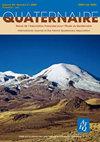从Eemien到人类世阿尔萨斯莱茵河沟渠的黄土、冲积物和斜坡沉积物:土壤地层方法、地貌和年代地理学
IF 0.7
4区 地球科学
Q4 GEOSCIENCES, MULTIDISCIPLINARY
引用次数: 0
摘要
根据大约60个剖面,提出了上莱茵地堑阿尔萨斯部分近13万年沉积矿床的年代地层格架,其中大多数剖面是在抢救考古作业中检查的。它基于土壤沉积档案和微观形态数据,并通过数字年代测定(放射性碳和OSL)完成。自130ka以来,Eemian和Weichselian早期冰川以一系列古土壤为代表,从70ka起被黄土沉积物覆盖。在70至35ka之间,后者在下和中Pleniglifac的中层间沉积期间形成了几种北极棕壤,其特征也在于冲积序列中来自莱茵河的局部细粒冲积层。上Plenigliface(35-16ka)的特征是厚的、通常是沙质的黄土沉积物,以及分别位于黄土和冲积序列中的砾石层。从16 ka开始,水文网络的一个主要切口将阿尔萨斯南半部的伊利诺伊河与莱茵河隔离开来。晚冰期(14,7-11,7 ka)仅在伊利诺伊河谷以细粒冲积层和古土壤为代表。在全新世早期和中期,富含松树的砂质冲积层沉积在莱茵河平原,而Eschau砾石体构成了斯特拉斯堡周围的伊利诺伊河和莱茵河的河道。广泛的luvisol的发展发生在伊利诺伊州、瑟尔州、布鲁赫州和佐恩河漫滩。从公元前一千年起,斜坡脚下出现的暴雨冲积层和崩积层截断了该冲积层。至少从中世纪开始,主要城市周围的水文网络是人为的,尽管主要的人为调整大多发生在20世纪。最后,在过去的13万年里,气候、地形和继承的地貌一直是控制地堑演变的主要因素,直到人类土方工程盛行的历史时期。然而,必须在互补剖面的基础上重新评估新构造的作用,以评估韦氏冲积层的厚度,同时还需要更好的空间分辨率。本文章由计算机程序翻译,如有差异,请以英文原文为准。
Loess, alluvions et dépôts de pente du Fossé rhénan en Alsace de l’Eemien à l’Anthropocène : approche pédosédimentaire, géomorphologie et chronostratigraphie
A chronostratigraphic framework of sedimentary deposits of the last 130 000 years is proposed for the Alsatian part of the Upper Rhine Graben based on about sixty profiles, most of them examined during operations of rescue archeology. It is based on pedo-sedimentary archives and micromorphological data and completed with numerical datings (radiocarbon and OSL). Since 130 ka, the Eemian and the Weichselian Early Glacial are represented by a succession of paleosoils, covered by loess deposits from 70 ka onwards. Between 70 and 35 ka, these latter hosted the development of several arctic brown soils during interstadials of both lower and middle Pleniglacial, also characterized by localized fine-grained alluvium from the Rhine in alluvial sequences. The Upper Pleniglacial (35-16 ka) is characterized by thick, often sandy, loess deposits and by gravel beds respectively in loessic and alluvial sequences. From 16 ka onwards, a major incision episode of the hydrographic network isolated the Ill course from that of the Rhine in the southern half of Alsace. The Lateglacial period (14,7-11,7 ka) is only represented in the Ill valley by fine-grained alluvium and paleosoils. During the Early and Middle Holocene, pine-rich sandy alluvium are deposited in the Rhine plain while the Eschau gravel body structured the course of the Ill and the Rhine around Strasbourg. The development of a widespread luvisol took place in the Ill, Thur, Bruche and Zorn floodplains. This luvisol is truncated by torrential alluvium and colluvial deposits that occurred at the foot of the slopes from the first millenia BCE onwards. At least from the Middle Age, the hydrographic network is artificialized around the main cities, although the main anthropogenic adjustments mostly occurred during the 20th century. Finally, climate, relief and inherited landforms have been the main factors controlling the graben’s evolution for the last 130 000 years, until the historical periods during which human earthworks have prevailed. However, the role of neotectonics must be re-evaluated on the basis of complementary profiles to assess the thickness of the Weichselian alluvium while a better spatial resolution is needed as well.
求助全文
通过发布文献求助,成功后即可免费获取论文全文。
去求助
来源期刊

Quaternaire
地学-地球科学综合
CiteScore
1.70
自引率
0.00%
发文量
18
审稿时长
>12 weeks
期刊介绍:
La revue Quaternaire créée dès 1964 par l"AFEQ sous le nom de Bulletin de l"AFEQ est devenue Quaternaire en 1990. Ce journal scientifique paraît au rythme de quatre numéros par an. La revue publie des numéros d"auteurs (par ordre d"arrivée des manuscrits après acceptation) ou des numéros thématiques sur proposition ou invitation par le comité de rédaction. Les articles (en langue française, anglaise ou allemande) traitant de tous les aspects du Quaternaire sont acceptés. La revue est publiée avec le concours du Centre National de la Recherche Scientifique.
 求助内容:
求助内容: 应助结果提醒方式:
应助结果提醒方式:


